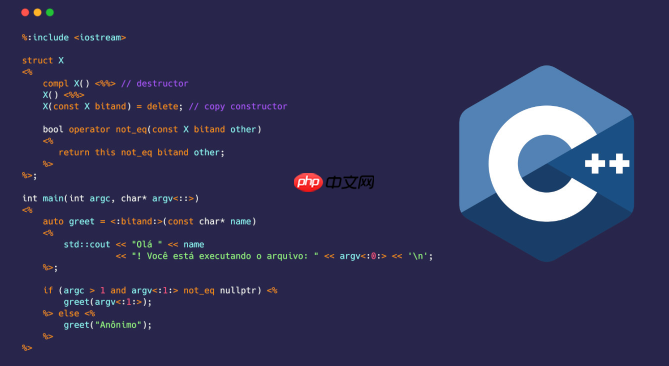c++++14引入的auto返回类型推导通过编译器自动分析return语句表达式来确定函数返回类型,简化了函数声明。1. 它极大提升了代码可读性和简洁性,特别是在泛型编程中无需手动使用decltype等复杂类型表达式;2. 增强了泛型代码的灵活性和健壮性,使函数能自动适配操作符重载、类型提升等变化;3. 支持lambda表达式更自然地编写,减少显式指定返回类型的需要;4. 在模板函数中应用广泛,如数值运算、转发函数等场景,显著减少样板代码;5. 但也存在限制,如不适用于递归函数、不能用于函数声明、多个return语句需保持类型一致等。总之,auto返回类型推导将类型推导责任转移给编译器,提高了开发效率并减少了人为错误。

C++14引入的
auto返回类型推导,极大地简化了函数声明,特别是那些返回类型复杂、依赖模板参数或由表达式决定的函数。它让编译器根据
return语句的表达式自动推断出函数的返回类型,省去了手动指定类型时的繁琐和潜在错误。

解决方案
使用C++14的
auto关键字来推导函数返回类型,你只需将函数声明中的具体返回类型替换为
auto即可。编译器会根据函数体内的
return语句所返回的表达式类型来自动确定最终的返回类型。这对于泛型编程、lambda表达式以及任何返回类型难以直接确定的场景都非常有用。

考虑一个简单的例子,我们可能想写一个函数来拼接两个字符串字面量:
立即学习“C++免费学习笔记(深入)”;
#include#include // C++11或更早版本,可能需要显式指定返回std::string // std::string concatenate(const char* s1, const char* s2) { // return std::string(s1) + s2; // } // C++14使用auto推导返回类型 auto concatenate(const char* s1, const char* s2) { return std::string(s1) + s2; // 返回类型被推导为std::string } int main() { auto result = concatenate("Hello, ", "World!"); std::cout << result << std::endl; // 输出:Hello, World! return 0; }
这个
concatenate函数,它的返回类型是
std::string,但我们不需要显式写出来。编译器看到
std::string(s1) + s2这个表达式,自然就推导出了。

更强大的地方在于模板函数。设想一个函数,它接受两个不同类型的数值,然后返回它们相加的结果。在C++11中,你可能得用
decltype结合尾置返回类型来处理:
// C++11 风格的模板函数,需要尾置返回类型和decltype templateauto add_cpp11(T a, U b) -> decltype(a + b) { return a + b; }
而在C++14里,这变得异常简洁:
// C++14 风格的模板函数,直接使用auto推导 templateauto add_cpp14(T a, U b) { return a + b; // 编译器推导a+b的类型 } int main() { int i = 5; double d = 3.14; auto sum_int_double = add_cpp14(i, d); // 推导为double std::cout << "Sum (int+double): " << sum_int_double << std::endl; long l = 10000000000LL; float f = 0.5f; auto sum_long_float = add_cpp14(l, f); // 推导为long double (取决于编译器和类型提升规则) std::cout << "Sum (long+float): " << sum_long_float << std::endl; return 0; }
这不仅减少了代码量,也让代码更易读,因为你不需要去猜测或计算
a + b最终会是什么类型,编译器会替你搞定。对于复杂的表达式,比如涉及多个操作符重载或用户自定义类型的场景,这种自动推导的优势就更明显了。
C++14的auto
返回类型推导为何如此重要?
C++14的
auto返回类型推导,不仅仅是语法糖,它从根本上改变了我们编写泛型代码的方式,尤其是在处理类型复杂性时。它的重要性体现在几个方面:
首先,极大地提升了代码的可读性和简洁性。想想看,在没有
auto返回类型推导之前,如果一个模板函数的返回类型依赖于其模板参数的某种复杂组合(比如,一个函数接受两个迭代器,返回它们解引用后相加的结果的类型),你可能需要使用
decltype结合
std::declval甚至
std::common_type等类型萃取器来精确指定返回类型。这不仅让函数签名变得冗长不堪,也让阅读者需要花费额外的精力去解析这些类型操作符,才能理解函数到底返回了什么。
auto直接把这些内部的类型推导逻辑隐藏起来,让函数签名回归到其核心功能上,更像是一种自然语言的表达。
其次,它让泛型编程变得更灵活、更健壮。在泛型代码中,我们常常不知道具体的类型是什么,只知道它们满足某些概念或操作。
auto返回类型推导允许我们编写“不知道返回类型是什么,但知道它就是
return表达式的类型”的函数。这避免了因为类型提升规则、操作符重载等导致的手动类型指定错误。比如,一个函数可能返回
int + double的结果(
double),或者
std::vector的结果(+ std::vector
std::vector),
auto都能正确处理。这种“让编译器去思考类型”的策略,减少了人为错误的可能性,并使代码在未来面对新的类型或操作符重载时,仍然能够保持正确性,无需修改函数签名。
再者,它解决了C++11中lambda表达式的一些痛点。在C++11中,lambda表达式如果返回类型不是
void,且包含多个
return语句,或者返回类型复杂,通常也需要显式指定返回类型。C++14的
auto推导规则扩展到lambda,使得lambda的编写更加流畅和自然,特别是那些用作算法参数的短小lambda。
总的来说,
auto返回类型推导是C++向更现代、更智能、更易于编写泛型代码方向迈出的重要一步。它减少了样板代码,提高了开发效率,并且让编译器承担了更多类型推导的责任,从而写出更少出错、更易维护的代码。
auto
返回类型推导在模板编程中的具体应用案例
在模板编程中,
auto返回类型推导的价值被发挥得淋漓尽致,因为它完美契合了泛型代码中“类型未知”的特性。我们来看几个具体的应用案例,它们展示了
auto如何简化那些过去需要复杂
decltype表达式才能处理的场景。
案例一:泛型数值运算
假设你有一个模板函数,用来计算两个任意数值类型参数的平均值。这个平均值的类型,最好是能够容纳这两个参数的类型提升后的结果。
#include#include // 用于检查类型 template auto calculate_average(T val1, U val2) { // 这里的(val1 + val2) / 2.0 的类型会根据C++的类型提升规则自动确定 // 例如,如果T是int,U是double,那么(val1 + val2)就是double,除以2.0后依然是double return (val1 + val2) / 2.0; } int main() { int i = 10; double d = 25.5; auto avg1 = calculate_average(i, d); // 推导为double std::cout << "Average of int and double: " << avg1 << std::endl; std::cout << "Type of avg1: " << typeid(avg1).name() << std::endl; // 实际类型名可能因编译器而异 long l = 10000000000LL; float f = 500.0f; auto avg2 = calculate_average(l, f); // 推导为double (通常是long double或double,取决于编译器) std::cout << "Average of long and float: " << avg2 << std::endl; std::cout << "Type of avg2: " << typeid(avg2).name() << std::endl; unsigned int ui = 7; short s = 3; auto avg3 = calculate_average(ui, s); // 推导为double std::cout << "Average of unsigned int and short: " << avg3 << std::endl; std::cout << "Type of avg3: " << typeid(avg3).name() << std::endl; return 0; }
在这里,
calculate_average函数的返回类型会根据
val1和
val2的具体类型以及它们相加后的类型提升规则,自动推导出最合适的类型。我们无需手动写出
decltype((val1 + val2) / 2.0)这样的复杂表达式。
案例二:转发函数(Forwarding Function)
当编写一个包装另一个函数的泛型函数时,我们常常需要完美转发参数并返回被包装函数的精确返回类型。
#include// For std::forward // 假设我们有一个简单的函数 int func_int(int x) { return x * 2; } double func_double(double x) { return x / 2.0; } // 泛型包装器,使用auto推导返回类型并完美转发参数 template auto call_and_log(Func f, Arg&& arg) { std::cout << "Calling function with arg: " << arg << std::endl; // 使用std::forward完美转发参数 auto result = f(std::forward (arg)); std::cout << "Function returned: " << result << std::endl; return result; // 返回被调用函数的实际返回类型 } int main() { auto res1 = call_and_log(func_int, 10); // 推导为int auto res2 = call_and_log(func_double, 20.0); // 推导为double return 0; }
在这个
call_and_log函数中,
auto返回类型推导确保了
call_and_log的返回类型与
f(std::forward的实际返回类型完全一致,无论是(arg))
int、
double还是其他任何类型。这在编写高阶函数、适配器或事件处理器时,提供了极大的便利和类型安全。
这些案例都清晰地展示了
auto返回类型推导在模板编程中的核心价值:它将类型推导的复杂性从程序员手中转移到了编译器,使得泛型代码更简洁、更灵活,也更不容易出错。
使用auto
推导返回类型时可能遇到的限制与注意事项
尽管C++14的
auto返回类型推导功能强大且便利,但它并非没有限制,在使用时也需要注意一些细节。了解这些可以帮助我们避免一些常见的陷阱。
1. 递归函数不能直接使用auto
推导
这是
auto返回类型推导的一个显著限制。如果一个函数是递归的,它的返回类型在函数定义之前是无法完全确定的,因为编译器需要知道返回类型才能推断出递归调用的类型。
// 错误:递归函数不能直接使用auto推导返回类型
// auto factorial(int n) {
// if (n <= 1) {
// return 1;
// }
// return n * factorial(n - 1); // 编译器在这里无法确定factorial的返回类型
// }对于递归函数,你仍然需要显式指定返回类型,或者在C++17及更高版本中,结合结构化绑定等新特性来间接处理(但通常还是直接指定类型更清晰)。
2. 仅适用于函数定义,不能用于函数声明
auto返回类型推导需要编译器能够看到函数的完整定义,以便分析
return语句的表达式。这意味着你不能在头文件中使用
auto来声明一个函数,然后在源文件中定义它。
// 在头文件 (header.h) 中:
// auto some_function(int x); // 错误:无法在声明中推导返回类型
// 在源文件 (source.cpp) 中:
// auto some_function(int x) { return x * 2.0; }如果你需要在头文件中声明函数,就必须显式指定其返回类型。这是因为编译器在编译调用该函数的代码时,需要知道其完整的签名,包括返回类型。
3. auto
推导遵循模板参数推导规则
auto返回类型推导的规则与模板参数推导的规则基本一致。这意味着,像顶层
const、
volatile以及引用(
&、
&&)等修饰符可能会被“剥离”或以特定方式处理。
const int get_value() { return 10; }
auto val = get_value(); // val的类型是int,const被剥离了
int& get_ref() { static int x = 5; return x; }
auto ref_val = get_ref(); // ref_val的类型是int,引用被剥离,变成值拷贝
// 如果你想要引用,需要显式写出:auto& ref_val = get_ref();这在使用
auto时需要特别留意,因为它可能导致你得到一个值拷贝而非引用,或者丢失
const属性,从而影响后续操作的正确性。
4. 多个return
语句必须推导出相同的类型
如果函数中有多个
return语句,它们所返回的表达式必须能推导出相同的类型。如果类型不一致,编译器会报错。
// 错误:返回类型不一致
// auto mixed_return(bool condition) {
// if (condition) {
// return 10; // int
// } else {
// return 3.14; // double
// }
// }在这种情况下,你需要显式地进行类型转换,使所有
return语句返回相同类型的值,或者显式指定函数的返回类型。
5. 有时显式类型更清晰
尽管
auto提供了便利,但在某些情况下,显式地写出返回类型反而能增加代码的可读性。特别是当返回类型非常简单明了(如
int,
bool,
void)时,使用
auto可能并没有带来太多简化,反而可能让阅读者需要多一步思考来确定实际类型。
// 显式指定int可能比auto更直观
int calculate_sum(int a, int b) {
return a + b;
}
// 尽管auto也行,但这里可能不如int清晰
// auto calculate_sum_auto(int a, int b) {
// return a + b;
// }选择使用
auto还是显式类型,应当在便利性、可读性和维护性之间取得平衡。对于复杂或依赖模板参数的类型,
auto无疑是首选;而对于简单、明确的类型,显式指定可能更佳。
理解这些限制和注意事项,可以帮助我们更安全、更有效地利用C++14的
auto返回类型推导,从而写出更健壮、更易维护的代码。






























